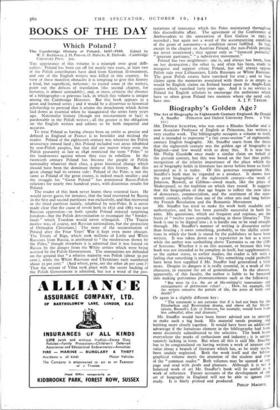BOOKS OF THE DAY
Which Poland ?
THE appearance of this volume is a triumph over great diffi- culties: Poland has been cut off for nearly two years, at least two of the Polish contributors have died from German ill-treatment, and one of the English writers was killed in this country. In view of these manifest obstacles it is tempting to give this history a kind, but superficial, welcome : to record some of the writers, point out the defects of translation (the second chapter, for instance, is almost unreadable), and, at most, criticise the absence of a bibiography—a grievous lack, in which this volume is unique among the Cambridge Histories. But this book appears in a great and learned series - and it would be a disservice to historical scholarship to pretend that it attains the detachment which Acton laid down as essential when he inaugurated the series forty years ago. Nationalist history (though not misstatement of fact) is pardonable in the Polish writers ; all the greater is the obligation on the English writers and editors to be both impartial and accurate.
To treat Poland as having always been an entity as precise and defined as England or France is to bewilder and mislead the reader. Poland of the eighteenth century was wherever the Polish aristocracy owned land ; this Poland included vast areas inhabited by non-Polish peoples, but that did not matter when even the Polish peasantry as late as 1846 restricted the term " Poles " to the landowners against whom they rose in rebellion. In the twentieth century Poland has become the people of Polish nationality whatever their class, a great historical change which should have been the dominant theme of this history. But this great change had its reverse side : Poland of the Poles is not the same as Poland of the great estates, is indeed much smaller ; and the 'struggle for "Great Poland" has dominated Russo-Polish relations for nearly two hundred years, with disastrous results for Poland.
The reader of this book never learns these essential facts. He would never guess, for instance, that the land recovered by Russia in the first and second partitions was exclusively, and that recovered in the third partition mainly, inhabited by non-Poles. It is never made clear that the cause of revolt both in 1831 and 1863 was not Russian oppression—in both epochs Poland enjoyefi surprising freedom—but the Polish determination to reconquer the " border- lands " which Tsardom would never relinquish. (The Tsarist motive was, of course, not Russian nationalism, but the protection of Orthodox Christians.) The story of the reconstitution of Poland after the Four Years' War is kept even more obscure. The Treaty of Riga, which took 'millions of Little and White Russians from Russia, is attributed to "the moderation shown by the Poles," though elsewhere it is admitted that it was forced on Russia by the danger from the White armies which were being assisted by the Polish Government. The annexations are defended on the ground that "a relative majority was Polish (about 30 per cent.), while the Whitt Russians and Ukrainians each numbered about 22 per cent." (And where, pray, are the other 26 per cent.?) That the seizure of Vilna took place with the secret backing of the Polish Government is admitted, but not a word of the pro-
testations of innocence which the Poles maintained throughout this discreditable affair. The agreement of the Conference of Ambassadors to the annexation of East Galicia in 1923 is recorded ; but again not a word of the accompanying condition of the grant of autonomy—a condition never fulfilled. In fact, except in the chapter on Austrian Poland, the non-Polish peoples are never mentioned ; they appear only as "fanatical peasants," "ignorant partisans," "a subversive movement." Poland has two neighbours : one is, and always has been, bent on her destruction ; the other is, and often has been, ready to recognise and support ethnic Poland, but will always oppose Polish rule over Lithuanians, Little Russians or 'White Russians, The great Polish estates have vanished for ever ; and to base claims upon the memories associated with them is as empty as would be English claims on Ireland based upon the Anglo-Irish estates which vanished forty years ago. And it is no service to Poland for English scholars to encourage the ambitions which have so often given Poland two enemies where she need only


























 Previous page
Previous page